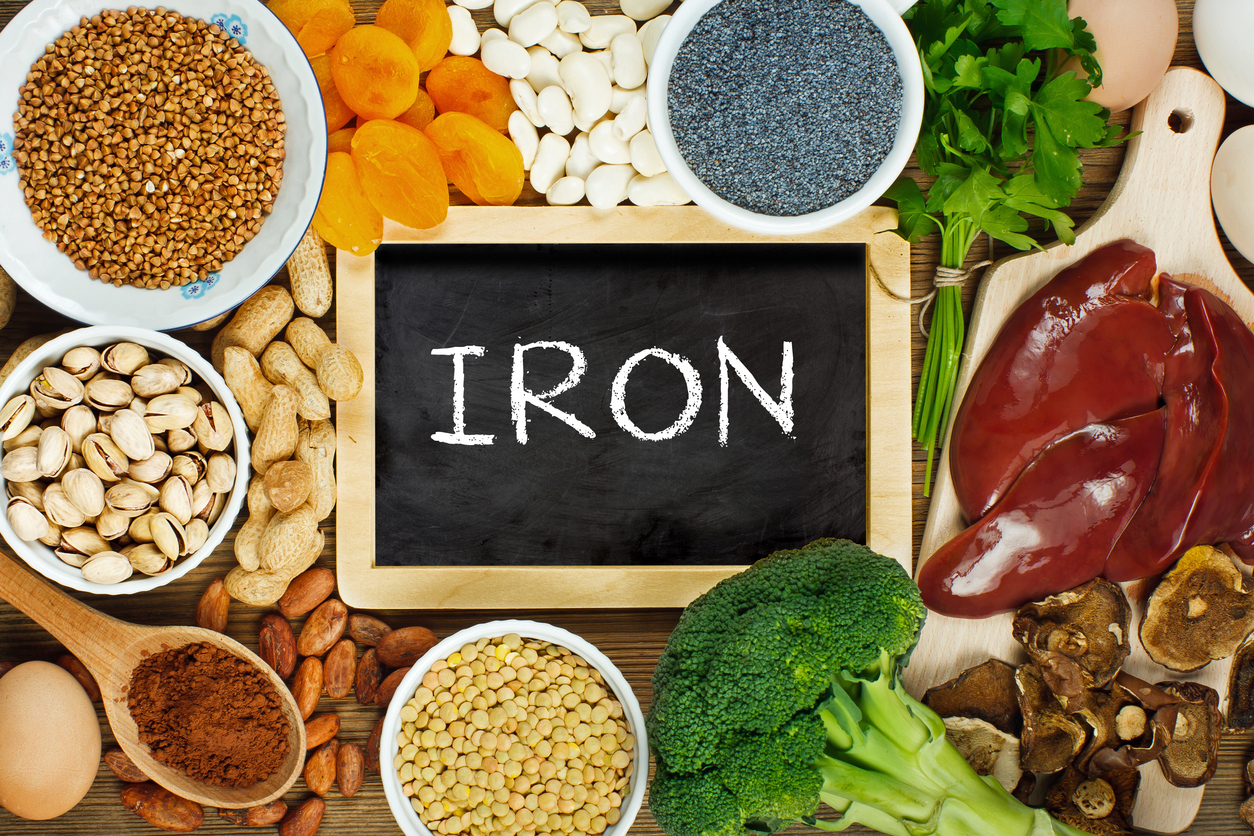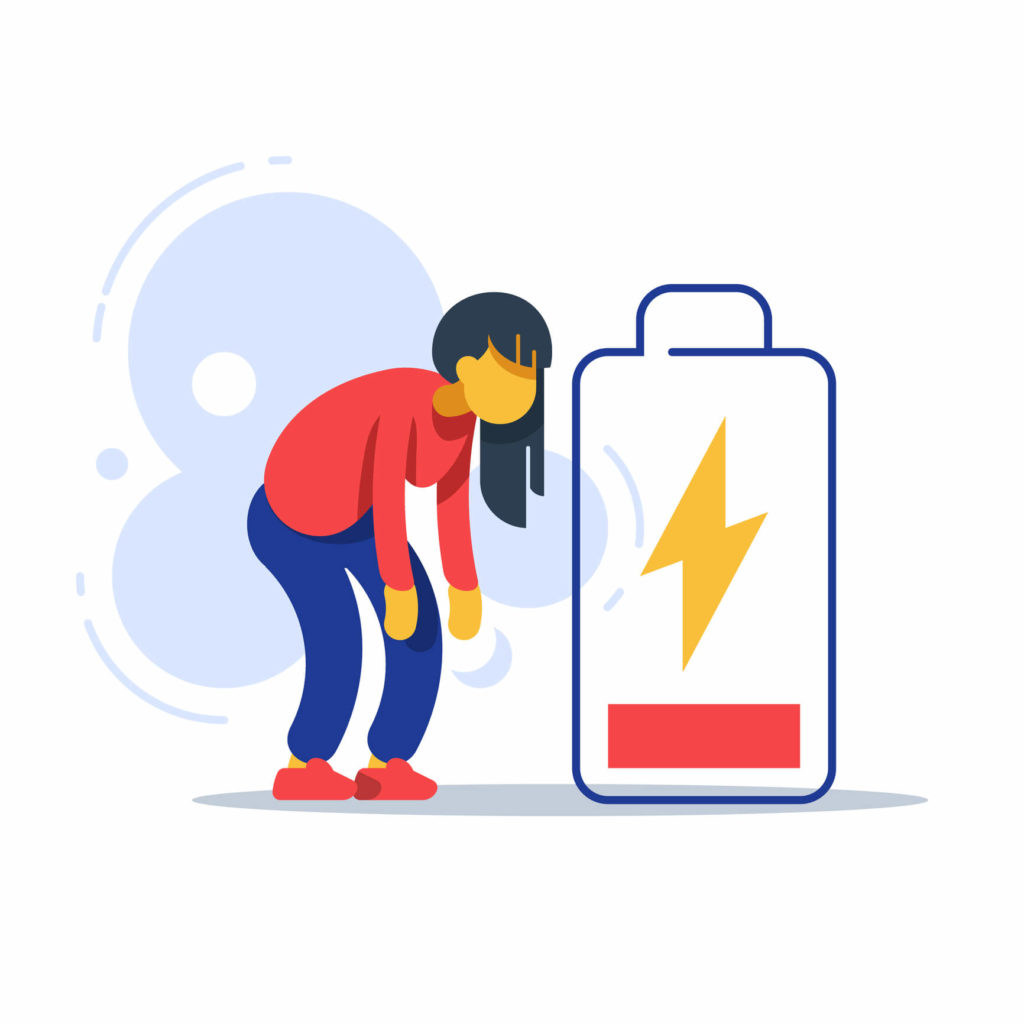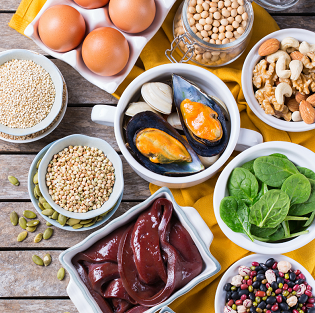
Think you suffer from iron deficiency? Iron deficiency is common and can be recognised by the symptoms of fatigue, shortness of breath, pallor, dizziness, headache, palpitations, tinnitus, and the feeling of fainting. In this blog, we discuss what iron deficiency is, what causes iron deficiency and how it can be treated and prevented.
What is iron deficiency?

Iron is an important building block of haemoglobin, a component of red blood cells. Haemoglobin absorbs oxygen and allows it to be transported around the body. With an iron deficiency, you have too little iron in your body. As a result, your body can make less haemoglobin and not enough oxygen is delivered to the body (Anna Hospital). You may experience various symptoms as a result.
Women, children, vegetarians and vegans in particular suffer from iron deficiency. They are a vulnerable group when it comes to iron deficiency and should pay extra attention to their iron intake.
Symptoms of iron deficiency

Iron deficiency brings unpleasant symptoms. Men's iron deficiency symptoms are pretty much the same as women's iron deficiency symptoms.
- Fatigue
When you suffer from iron deficiency, your body cannot make enough haemoglobin. As a result, not enough oxygen is delivered to your body, resulting in less energy and faster fatigue (especially during exercise).
- Shortness of breath
Do you feel like you are out of breath faster when performing daily activities than normal? This is also one of the symptoms of iron deficiency. Iron deficiency causes oxygen levels in our body to be low. As a result, your muscles do not receive enough oxygen to perform activities. Your body then tries to receive extra oxygen by increasing breathing. This causes you to run out of breath faster.
- Paleness
Another common symptom of iron deficiency in men and women is pale skin. The colour of the skin is determined, among other things, by the colour of the blood. A shortage of haemoglobin makes your blood less red in colour. As a result, your skin loses the pink colour and becomes paler.
- Headaches and dizziness
Headaches and dizziness are also symptoms of iron deficiency. These symptoms are often accompanied and caused by low haemoglobin levels in your body. Low haemoglobin levels mean your brain receives less oxygen. The lack of oxygen in the brain then causes your blood vessels to swell and create extra pressure. You may experience headaches and a feeling of dizziness as a result.
- Palpitations
As mentioned earlier, iron deficiency means your body has less oxygen. However, your body desperately needs this oxygen. Your body tries to pump extra oxygen around by making the heart beat faster. This may cause an irregular or accelerated heartbeat and palpitations. In addition, symptoms such as tinnitus, hair loss and the feeling of fainting are possible complaints with iron deficiency.
Causes of iron deficiency

Iron deficiency has several causes. In women, iron deficiency is often caused by heavy blood loss during menstruation. In men (and women who no longer menstruate), it is often caused by blood loss from the stomach or intestine (Anaemia - Máxima MC, 2017). It can also be caused by not getting enough iron from food or by an increased need for iron, for example during pregnancy. Furthermore, it can occur due to an infection or reduced absorption in the intestines.
Treatment of iron deficiency
To remedy iron deficiency, it is important to determine its cause. Therefore, the doctor first tries to identify the cause of the iron deficiency. Usually, the doctor prescribes iron tablets. When treating the iron deficiency with iron tablets is not suitable or supplementing the iron deficiency is not fast enough, the doctor sometimes chooses to prescribe an iron preparation such as ferrous sulphate.
Preventing iron deficiency
The symptoms of iron deficiency are often very annoying and can interfere with daily life. Prevention of iron deficiency is therefore better than cure!
You can prevent iron deficiency by consuming foods rich in iron. You can also maintain your iron levels by making lifestyle changes or taking iron supplements.
Foods rich in iron
There are several foods that are rich in iron and help you reach the daily required amount of iron. A large proportion of foods contain iron, but not all of them contain the same amount of iron. It is therefore important to eat and drink a variety of foods.
Foods high in iron are bread and cereal products, meats (mainly beef), potatoes, legumes and nuts and seeds. Vegetables such as asparagus, rocket, broccoli, lamb's lettuce and spinach are also high in iron. Furthermore, dried fruits like dates, figs and sultanas and fresh fruits like watermelon, blackcurrants, apricots, peaches and plums are high in iron. Consuming these products remedies iron deficiency.
Supplementing iron deficiency with iron supplements
It often turns out that it is difficult to overcome iron deficiency with only foods rich in iron. You can then supplement your iron deficiency with energy supplements in addition to consuming iron-rich foods. This may make you feel less tired and have more energy.
With an iron deficiency, your body can produce less haemoglobin, so not enough oxygen is delivered to the body. Taking extra vitamin B12 allows the body to make more red blood cells containing haemoglobin. This increases oxygen in the blood.
Lifestyle changes to prevent iron deficiency
A healthy lifestyle can also prevent iron deficiency. Sufficient exercise helps improve metabolism and a relaxed body ensures better absorption of nutrients (including iron!). In addition, drink coffee and tea in moderation. Coffee and tea can actually hinder the absorption of iron in the blood.
Sources
https://www.bernhoven.nl/folders/voedingsadviezen-bij-ijzertekort/
https://www.voedingscentrum.nl/nl/service/vraag-en-antwoord/gezonde-voeding-en-voedingsstoffen/symptomen-ijzertekort.aspx
https://www.st-anna.nl/behandelingen/die009-voedingsadvies-bij-ijzertekort/
https://www.rodekruis.be/nieuws-kalender/blog/5-tips-om-ijzertekort-te-voorkomen/
https://proveg.com/nl/plantaardige-voeding-en-lifestyle/vegan-voedingsstoffen/ijzertekort/
https://www.vitamine-info.nl/nieuwsartikel/article/zo-kun-je-een-ijzertekort-voorkomen-519/
https://www.gezondheidenwetenschap.be/richtlijnen/bloedarmoede-door-ijzertekort
https://www.mmc.nl/internegeneeskunde/aandoeningen-en-behandelingen/bloedarmoede/#:~:text=Dit%20tekort%20aan%20ijzer%20komt,middenrifbreuk%2C%20poliepen%20of%20een%20ontsteking.
https://www.elle.com/nl/beauty-health/health/a570570/symptomen-ijzertekort-ijzer/
https://www.activeiron.com/nl/blog/10-tekenen-en-symptomen-van-een-ijzertekort/
https://www.gezondheidsplein.nl/aandoeningen/ijzertekort/item39903
https://www.delevensstijl.nl/asjas-blog/artikel/5-ijzersterke-aanwijzingen-voor-ijzertekort-hoe-voorkom-je-dat
https://www.promovendum.nl/blog/ijzerrijke-voeding-top-15#:~:text=Op%20zoek%20naar%20%C3%A9cht%20ijzerrijk,%2C%20abrikozen%2C%20perziken%20en%20pruimen.
